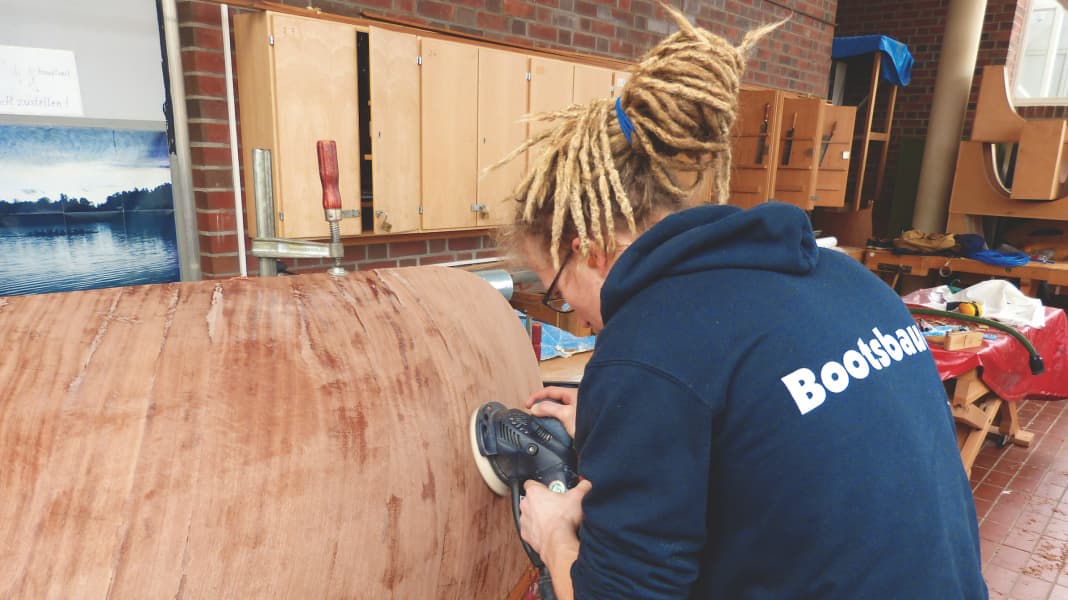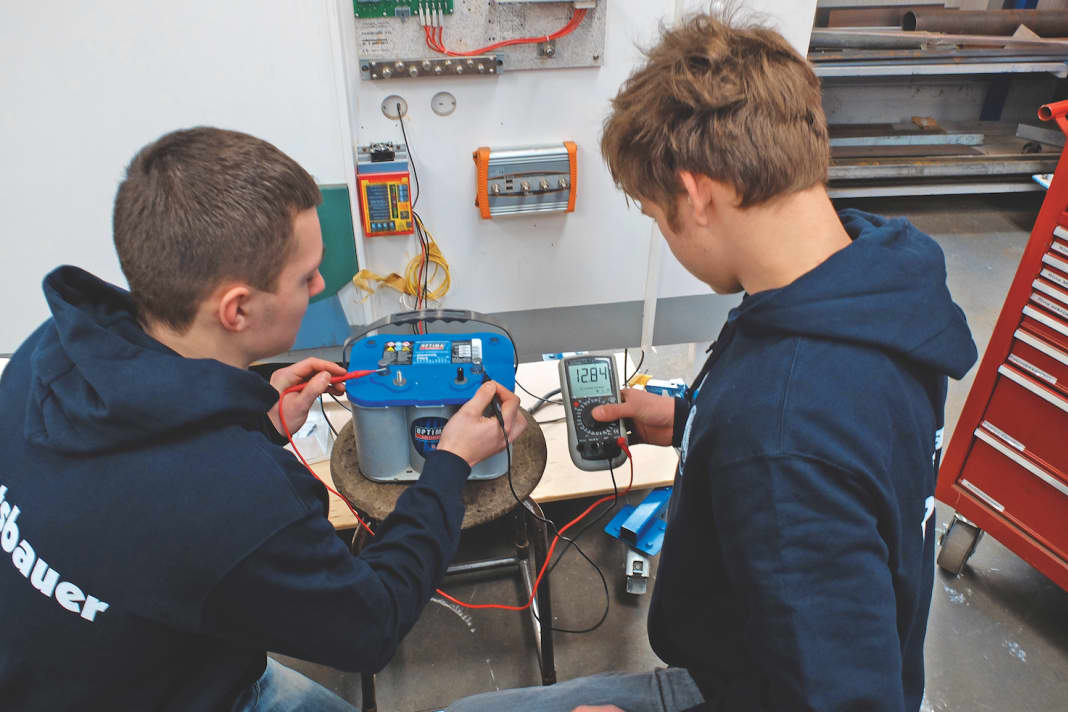
Craft trades are becoming increasingly interesting for young people. The number of high school graduates who are initially completing vocational training in a trade in order to possibly build on this later or even graduate with a degree is now increasing significantly.
They are usually restricted to one area of specialisation - woodworking, metal construction, mechanics and electrics are the most popular subjects. However, there are also professions that require a wholewide Spectrum and in which enormousVersatility is required.






This includes boatbuilding in particular, a recognised training occupation under the Vocational Training Act (BBiG) and the Crafts Code (HwO). The boatbuilding apprenticeship can be divided intotwo Choose a specialisation: New construction, extension and conversion or yacht technology.
Here, the handling of a wide range of materials must be learnt and understood. Wood, metal, fibre composites, GRP, resins, paints and adhesives are materials with which the boat builder is confronted. In addition, there are machines and acomplex Boat technology.
Not everywhere in the country is this very regionally specific profession. Boatbuilding companies are generally located on the waterfront, so many people in other parts of the country are unaware that this varied and interesting sector even exists and that, above all, the chances of being taken on and promoted at the end of the apprenticeship are good.more than good are.
Applicants for this profession are often already in theYouth have come into contact with water sports and have experience as a sailor or motorboat driver, whether through their parents' boat or membership of a club. What is also interesting for many is that after completing their training, there is certainly the opportunity to work abroad for a few years and thus broaden their horizons in all directions.
In principle, however, the boat and yacht building companies endeavour to train their trainees into hold and integrate them into their own company. The industry has a lot to do, hardly anyone - or anyone - will end up on the street. After all, a good ten per cent of trainees are now female and are performing brilliantly in this job.
What do you need to bring with you?
In principle, the training companies want or require the following prerequisites:
- Secondary school leaving certificate
- Good grades in the subjects German, arithmetic,
spatial theory and drawing
- Good health and a strong constitution,
no allergies to paints, resins and wood dust
- Good spatial imagination
- above-average sense of form and
craftsmanship
In general, applicants are also expected to be able to use the machines and equipment suitable for the various materials correctly and to operate and use them safely.
Where can the training be completed?
The German Boat and Shipbuilders' Association (DBSV) maintains a list of all companies that train boatbuilders in the respective region, sorted by postcode. Interested parties can find them on the Internet at www.dbsv.de/de/ausbildung-zum-bootsbauer.
After selecting one or more companies, you submit your application to them. The apprenticeship takes place in the dual system of vocational training, runs for three and a half years and ends with the completion of the journeyman's examination. The relevant vocational schools are located in Lübeck-Travemünde, Bremen, Duisburg and Brake. Trainees from federal states where there is no suitable vocational school attend the vocational school of the Lübeck Chamber of Crafts, where the photos for this article were taken.
How do you get started?
Before a prospective apprentice receives an apprenticeship contract, they will usually complete a six-month work placement. This gives both the applicant and the training company the opportunity to assess suitability and only then make a final decision. If the result is favourable, the whole thing is sealed with a training contract.
How does the training work?
Now the dual system begins to take effect. The trainee is initially entrusted with simple tasks in the company for a period of three months in order to gain an initial impression of their future profession. They then switch to vocational school for four weeks before returning to their training company. This cycle extends over the entire training period, with a total of ten teaching blocks of four weeks each to be completed in order to deepen the theoretical and practical knowledge in the lecture theatre and in the workshops.
The vocational students then live in the school's own boarding school, such as in Lübeck-Travemünde, which offers around 450 places and a wide range of leisure facilities. However, not all of them take advantage of this comfortable offer. Some students join together and rent a holiday home, and some even come with their own boat to spend the night on it. The mooring is right behind the school.
What specialisations are there?
After two years of training, part one of the journeyman's examination is on the agenda. This is where the common path separates, because now it is time to decide on one of the two options: the specialisation in new construction, extension and conversion or the specialisation in technology. Both end separately with the second part of the journeyman's examination.
The syllabus is extremely comprehensive and demands a high level of commitment, concentration and willingness to learn from the trainees.
The joint training programme leading up to the first partial examination covers important basics: the manual and mechanical production of components, the processing of fibre composites, the selection of hull constructions, the processing of deck constructions, the installation of technical systems and design theory.
In the second training block, the content differs depending on the chosen specialisation. In the new construction, extension and conversion branch, the focus is on the manufacture of hulls and surfaces, decks and masts as well as their maintenance.
In the technical specialisation, on the other hand, the trainees deal with propulsion/propulsion technology, steering gear, electrical and electronic on-board systems, the installation of supply and comfort systems and the equipping and maintenance of rigging systems.
Almost 90 per cent of trainee boat builders complete their training by passing their journeyman's examination. If their performance is not so satisfactory, they can improve it in a re-examination. Drop-outs are rare. However, it does happen that an apprentice decides to specialise in a different field during their apprenticeship. This is possible up to part one of the journeyman's examination.
The school in Lübeck-Travemünde even has a Bavaria 36 sailing yacht and a motorboat, on which the trainees can not only obtain their boat licence, but also learn proper seamanship during longer sailing trips.
sailing trips to learn proper seamanship in practice. After all, the open Baltic Sea is right on the doorstep.
How can you get further training?
The maritime competence centre in Lübeck-Travemünde regularly offers advanced training courses. Nowadays, it is possible to start training to become a master boat builder soon after passing the journeyman's examination. This used to require several years of professional experience, but this is no longer required.
The other route is via a subsequent Bachelor's and Master's degree programme, which in Germany can be completed at universities in Hamburg, Berlin and Kiel, among others. In this way, qualified boat builders have the opportunity to acquire in-depth mathematical, scientific and engineering fundamentals, supplemented by subjects that are particularly in demand in shipbuilding.
What makes the job so attractive?
The profession of boat builder is one of the most multifaceted and demanding in terms of craftsmanship - and incidentally one of the oldest in the world. Hardly any other industry demands so much creativity and technical versatility. There are often true artists among the graduates, and quite a few have become famous for their skills in this trade.
And the salary? After completing training, the starting salary is around 2,000 euros per month, although the amount naturally also depends on the size of the company and the individual skills and qualifications of the applicant. But the decisive factor for boat builders is probably job satisfaction and the feeling of having created something with your mind and hands that will give other people pleasure for many years to come - a boat, a yacht or perhaps a very special piece of equipment.

